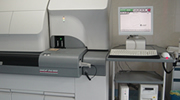【Warm Doctor Essay Solicitation】Bend My Backbone, and Shoulder Your Hope
Hits: 3095 Time: 2020-07-01
A letter of thanks with neat handwriting fell off my notebook when I was going through the previous patient records at mid-night. “I had been very pessimistic due to this disease, and it was they who gave me the light”, the warm memories suddenly appeared in front of me when I saw these two sentences of sincere thanks.
That’s an elderly patient more than 80 years old, with diabetes complication foot gangrene. He was accompanied by his wife and daughter to our hospital, we found his right sole had been seriously festered, his toes were in necrosis and black, and was almost at the margin of amputation. We carefully examined the patient’s right foot and asked about his pain, and the patient very firmly told us “no pain at all”, and he stubbornly told us this disease didn’t need any treatment, and nothing happed although he had left with diabetes for more than 20 years. We specifically and patiently told him the current illness and treatment methods, and hoped the patient could cooperate us in treatment. But when the elderly patient heard that it might be performed with amputation, he became very emotional and was very unwilling to face, and was even pessimistic. He was frequently complaining to us in tears that he could not lose his foot and was incooperative to treatment. Our team also felt very difficult facing this tough situation, and several internal workshops were held about the illness of the elderly patient. We jointly discussed about the resolution, on one hand, comforted the patient from his psychology concern to get his cooperation; on the other hand, adopted the treatment method of toe amputation + debridement, and helped him to save his limb as much as possible. The dressing change process was very difficult after operation. Because the patient had serious wound on his foot, with mass necrosis of foot tissues. At the beginning, nearly 40 minutes were needed per day for debridement, and our doctors had to matain a bending and knee-bending gesture. We were too tired to stand up everytime after finishing the debridement. Psychological treatment was also required for physical disease. We were also continuously offering spiritual comfort and encouragement besides carefully cnducting debridement. The team had formulated a detailed and thorough operation plan, and at the same time we had fully communicated with families of the patient, so that all families of the patient had a certain knowlege about the treatment method, and strengthened the encourage and confidence of conquering the illness. Finally, under the conerted efforts from our department and under cooperation from the elderly patient, the foot of the patient graudally recovered after 3-month debridement and dressing change. The frequency of dressing change was once per day, and later it’s once every several days, and the patient’s foot gradually recovered. The elderly patient trudged to our office with walking aids, and his gratitude and moved feeling was overflowing. He tightly held my hands and put this letter of thanks into my hand, and then gave us a deep bow supported by his daughter.
In the busy daily work of surgery, we pay equal attention to fatigue and hardships, but we have also received many banners and letters of thanks, each of which has a heart-warming story between doctors and patients. Often recalled, these warm stories are dazzling stars, illuminating the road of our surgeons.
In my opinion, no matter what kind of disease we are facing, we should pay attention to humanistic care in the process of diagnosis and treatment, and we should call for and amplify the warmth of human nature. I still firmly remember the instructions from my director when I first joint the hospital: mastering superhand practical skills, starting from the subtle, learning to replace thinking, think what the patient thinks, and be urgent what the patient is urgent, caring every patient with responsibility, making efforts and helping the patients to alleviate pains and recover as soon as possible with exquisite techniques and sincere love, and making yourself worthy of being an angle in white.
Written by He Zehuang of No.13 Department of Clinical





